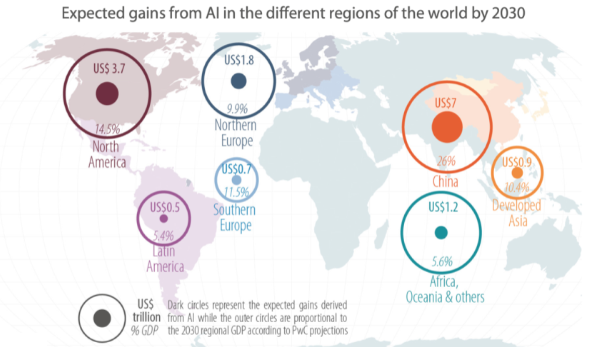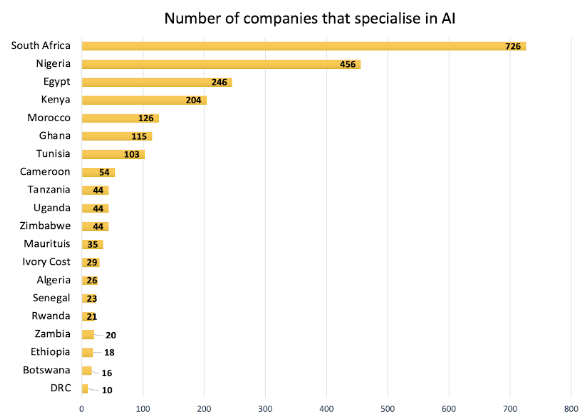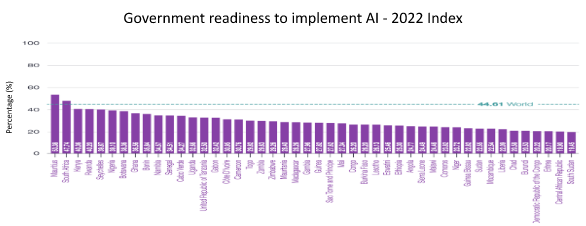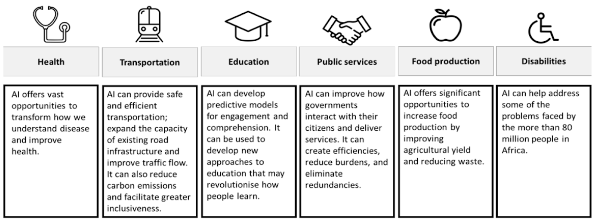
By Nikita Bhavan, Economics Postgraduate from the University of Johannesburg
AI can alleviate socio-economic issues in emerging economies. AI offers Africa a wealth of opportunities to compete globally and stay at the forefront of economic change.
Artificial Intelligence (AI) technologies are fast-tracking the transformation of numerous sectors within Africa and the global economy. In Sub-Saharan Africa countries such as South Africa, Kenya, Nigeria and Egypt are at the forefront of this trend.
The integration of AI into various industries in Africa is bringing about great progress and innovation. AI has the potential to solve some of the region’s most prevalent problems. From reducing poverty and improving education, providing sufficient health care services, addressing sustainability challenges, meeting the growing food needs of a rapidly expanding population, and promoting social inclusion. AI is democratising access to innovative, productivity-enhancing technologies and driving the growth the continent needs.
A recent study on the global long-term economic effects of artificial intelligence (AI) found that by 2030, AI can double a nation’s GDP growth rate. In Africa, the continent has the potential to expand by $1.2 trillion by 2030 (approximately 50% of the continent’s current GDP), by acquiring 10% of the rapidly expanding AI market. The ability to capture even a small portion of this advantage creates significant leverage for boosting the continent’s economic growth and creating employment and investment opportunities. Leading industries such as agriculture, healthcare, public services, and financial services are expected to grow substantially from the integration of AI.
Of the above-mentioned sectors, agriculture and finance are amongst the top 5 fastest growing sectors in Africa.

Source: The macroeconomic impact of artificial intelligence, PWC 2018
In agriculture:
Agriculture is the largest economic sector, accounting for 15% of the continent’s GDP (US$100 billion annually) and employs 65% of the continent’s labour force. AI can ascend the agriculture sector through enhanced intra-African trade which will bolster GDP growth, create employment opportunities, improve inclusivity and address changing consumer demands.
Countries across Africa are grappling with food insecurity and extreme hunger which has been exacerbated by price spikes caused by global shocks, notably, trade disruptions from Russia’s invasion of Ukraine. AI can potentially decrease these economies’ reliance on long-established but sub-optimal exports with the use of agro-processing. Agro-processing will increase the capacity to process grains, fertilizers, and other agricultural products, thereby allowing African nations to take advantage of the significant benefits to build wealth domestically, strengthen economic growth and development and create food security.
Additionally, the advantages of integrating digital technology into agriculture go beyond factors such as increased yields. Entry points like precision farming, equipment leasing, and service provision can address the significant challenge of attracting job-seeking and entrepreneurial youth. Nowhere is the question of job creation more pressing than in sub-Saharan Africa, where 70% of the population is under 30.
In Africa’s economy, digital platforms are removing obstacles to financial and economic participation. For instance, Insight2impact published findings that examined the landscape and expanding effect of digital platforms in sub-Saharan Africa. These findings identified 277 distinct digital platforms that provide more than 4.8 million citizens with the chance to earn a living. Just 3% of these platforms are active in the agricultural sector, but in the few instances when they do, it has been discovered that they significantly aid in the economic inclusion of women farmers. Economic inclusion is the objective through which digital solutions can generate for women in agribusiness.
According to a report released by the International Food Policy Research Institute, the average productivity of farmers in Africa continues to be significantly lower than that of other emerging-market regions, such as Asia, Latin America, and the Caribbean. Also, it has been discovered that digital solutions have a tangible and advantageous effect on boosting production in Africa’s agricultural sector. 390 active digital solutions were found to be responsible for a 73% increase in farmer productivity and a 37% rise in farmer revenue, according to a report released by CTA. For instance, DigaFarm in Kenya encourages the creation of services that aid small-scale farmers in raising their revenue and production. The portal has touched more than 1 million farmers, of which 43% are women, and specifically emphasises gender inclusion in agribusiness.

Source: Quartz – Africa is joining the global AI revolution
Financial Services:
Financial sector development is recognized as an important factor in reducing poverty in developing countries. In Africa, the financial services platform is expected to grow to USD 405 billion by 2030. That’s more than double the average of USD 204 billion in 2018. There is a growing number of African digital platforms offering financial services. These financial platforms offer one or more insurance, digital wallet, savings or credit products. This is an indication of Africa’s potential to extend the reach of multiple categories of financial services to new or underserved individuals and small businesses.
The African banking market has been gaining immense interest over the years. The sector is growing rapidly, earning almost double the global average, and has harnessed various digital financial innovations. In 2021, Nigerian fintech startup Kuda Bank introduced a chatbot feature that allows customers to transact via its messaging platform. Chatbots also provide real-time updates on account balances, transaction history, and other services.
Zande Africa, a fintech company in South Africa is using AI to provide microcredit to small businesses and in Kenya, AI-powered solutions assisted with processing loan applications in a matter of minutes.
According to the World Bank, financial inclusivity is fundamental to reducing extreme poverty, promoting sustainable and inclusive economic growth and development, and increasing shared economic prosperity. Greater financial inclusion will enable previously excluded people to borrow, save, invest and start businesses while coping with socioeconomic disruptions. A more financially inclusive society is greatly beneficial for the broader economy. McKinsey conducted a study which estimated that leveraging digital financial services for inclusion could increase emerging economies’ GDP by $3.7 trillion within a decade.
Nonetheless, the adoption of AI in Africa’s fintech industry is not without challenges.
Africa has had a leading edge in the mobile money industry over the past decade, which significantly expanded access to financial services in resource-poor regions across the continent. Digital services have created new pathways to manage finances, therewith allowing swift transactions to occur without the need for internet access or bank accounts. However, a major obstacle to further the growth of Africa’s digital economy is unequal access to these digital financial services. According to the Global System for Mobile Communications Association, the number of mobile money accounts in sub-Saharan Africa continues to grow, but less than 30% of these accounts are active.
Large segments of the population, including low-income individuals, small business owners, people with disabilities, women and people in rural areas, are unable to participate in or benefit from digital financial services. Extending mobile money services to savings, credit and insurance services should be considered to achieve greater financial inclusion.

Source: Government AI Readiness Index 2022
Many structural challenges hinder the rapid adoption and implementation of AI on the continent. Poor foundations and digital infrastructure undermine critical connectivity, thus undermining efforts to deliver AI-powered solutions. A substantial shift in government policy is necessary to address the roadblocks. AI will necessitate significant changes for both labour and businesses, as well as new ethical considerations. The government’s capacity to promote cooperation between state and civil society, academics, business, and national and international stakeholders will determine the level of success the continent can reach to harness the transformational effects of AI.
AI is an enabler of socio-economic development in emerging economies and could help address some of the most challenging social problems. Through boosting productivity, growth and development, AI presents Africa with a plethora of opportunities to compete globally and stay at the forefront of economic change.

Source: Artificial Intelligence for Africa: An opportunity for growth, development and democratisation

Nikita Bhavan
Nikita holds a Postgraduate degree in Economics from the University of Johannesburg, South Africa. She has recently completed a Research internship at the Financial and Fiscal Commission. She has a strong interest in macroeconomics, public and social economics and policy analysis. Currently seeking new opportunities, she aspires to collaborate on projects with institutions and companies across different industries to engender impactful and transformative solutions to global economic and financial challenges.
I’m impressed, I need to say. Really not often do I encounter a blog that’s each educative and entertaining, and let me let you know, you will have hit the nail on the head. Your idea is excellent; the problem is one thing that not enough individuals are talking intelligently about. I’m very completely happy that I stumbled across this in my seek for something regarding this.
Thank you for sharing with us, I think this website genuinely stands out : D.